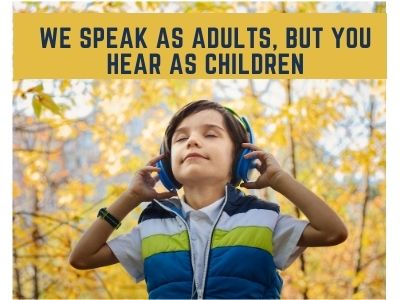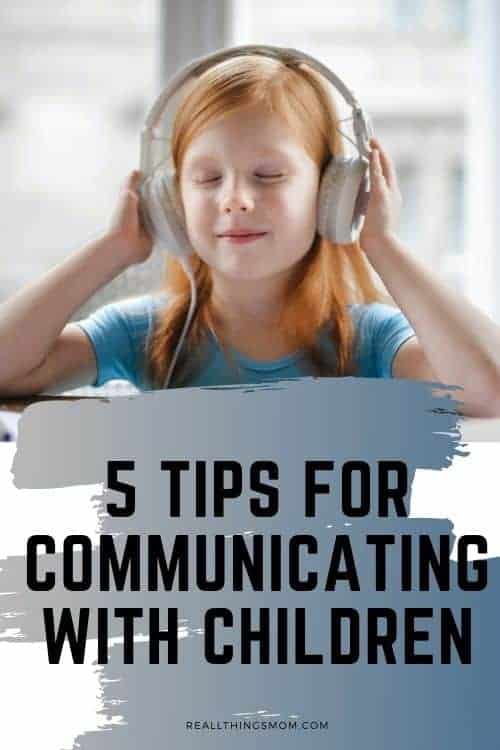
We’ve all heard that good communication is the secret sauce to a successful marriage. I think it’s one ingredient in the secret sauce; however, the main idea, that good communication is important, is true of marriages…and of relationships with children. Communicating with your children in a positive way is imperative to your relationships with them!
Ward Cleaver, the quintessential father-figure, said, “We speak as adults, but you hear as children.” Is that not profound? When I think of the words I say to my children, how I say them, and how frustrated I become when they don’t do what I’ve told them to do, I wonder, “Do my kids actually not listen? Or is there a communication breakdown somewhere? Or both?”
I’m a little ashamed to admit that I hadn’t really thought about it much until the Beav misunderstood his dad’s instructions and, unfortunately for me, I don’t have a team of writers carefully crafting all of my parenting responses. But Ward Cleaver was right! And his words deserve some careful evaluation on our parts as parents.
“We speak as adults, but you hear as children.”
So, now that we have that knowledge, what can we do with it? Well, we need work on communicating clearly with our children. First, it’s good to understand some of the main differences between how children communicate and how adults communicate.
Five Ways Communicating with Children is Different than Communicating with Adults:
- Children Do Not Read Faces Like Adults Do—
Did you know that a child’s brain does not process facial expressions the way adults do? Even teenagers! Especially teenagers! Sometimes, I assume my children can see the look on my face and know how I am feeling, but this is just not always true.
My adopted daughter definitely struggles with reading expressions. One day, she asked me, “Are you angry, Mommy?” Me? Angry? NEVER! Actually, I wasn’t angry at that moment and I asked her, “Do I look angry?” She replied honestly, “I don’t know.”
Because I know she struggles, I often will say to her, “Look at my face. How do you think I’m feeling?” And then explain to her why I feel the way I do.
This is also one of the main causes of communication breakdown with teenagers. I only recently learned through reading Your Teenager is Not Crazy (highly recommend and no affiliation!) that not even teenagers can decipher facial expressions the way adults do. So, don’t assume that your body language is sending a clear message. Take the time to explain your feelings to your children.
- Children Take Things More Literally Than Adults Do—
Some children are more literal thinkers than others, but in general, all children are more literal thinkers than adults. This is a serious problem for me in my communication.
First of all, I am a total hypocrite when it comes to sarcasm. My husband and my son are just not sarcastic people. They’re not. And they only use sarcasm when they are arguing or upset with me. Ooh. I hate that. But I think it’s perfectly fine for me to use sarcasm whenEVER I deem necessary! Okay. I’m working on that.
- Adults Communicate Face to Face; Children Often Can’t—
When I am speaking to one of my children, I expect him to look at me! I expect full eye contact and no distractions when I am having a conversation, or, let’s be honest, giving a lecture. But how often do I give that same respect to my children? I do try. I probably do better than some, comparatively; but I don’t want to be fine, comparatively. I need to be better.
Many moms are looking down at their phones when their child is speaking to them. They don’t even look up, but instead say, “Uh-huh.” Or something similar. I hate when people do that to me! So, why is that okay for our children? Don’t they deserve to have a face to face conversation with their mom?
- Children Have a Much Smaller Vocabulary—
Sometimes, we expect our children to understand their own feelings as well as adults do. And yet, I can’t even count the number of times I have just felt crabby, or anxious, or moody, without any idea as to why I feel that way! How can we expect our children, then, to not only understand their feelings, but to communicate them?
It’s important to help build your child’s emotional vocabulary. Teach him words that will help him tell you how he feels. Often, if your child is upset, it’s helpful to empathize and say something like, “It seems like you’re angry because ____.” Using that language with your child models the language you would like her to use.
- Your Child Does Not Have Adult Insight—
Of course, there are things that your child may be upset about that you, as an adult, know is not a big deal in the big picture. But through a child’s eyes, it IS a BIG DEAL! Try not to blow that feeling off. Especially with teenagers!
Try to remember what it was like to be a teenager. How many people do you know that would love to go back to high school? Um…none for me. This shows that yes, while teenagers don’t have bills to pay, and their biggest concerns are usually regarding their social lives, it is still not an easy time of life.
Communicating with children is similar to teens in that they just don’t have the big picture knowledge that adults have. Sometimes, we think about child issues like adults, instead of putting ourselves in their shoes and empathizing with them.
Don’t stop at empathizing though. Children will never gain the bigger picture knowledge if you don’t explain it to them! It’s completely fine to say, “I know this is a big deal right now, but soon, you will see that it’s not so bad.”
Empathy is something we strive to teach our children, but the best way to teach it is to model it—with them! Truly, we don’t need to empathize; we can sympathize! We’ve been there, done that; but that’s not a reason to act high and mighty with our teens. Instead, that’s a reason to truly step into their shoes and remember what it was like.
Remember, the next time you’re frustrated that your child is not listening: “We speak as adults, but [they] hear as children.”
RElated: Speak Your Child’s Love Language
